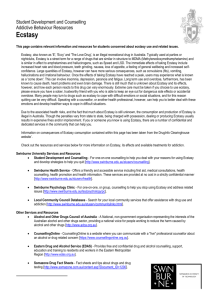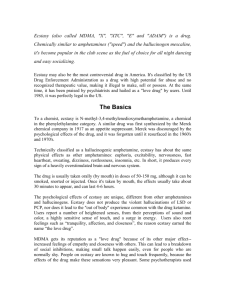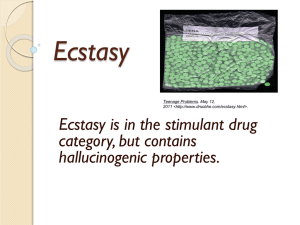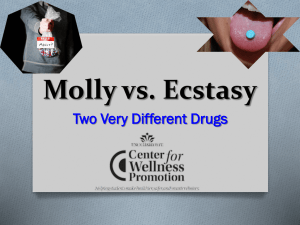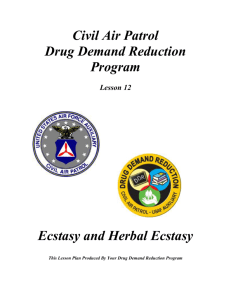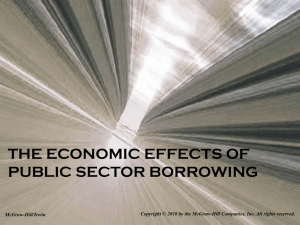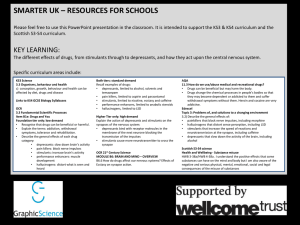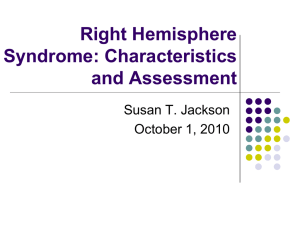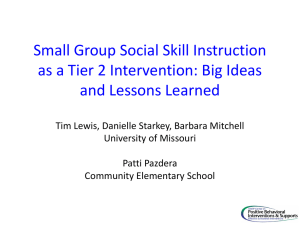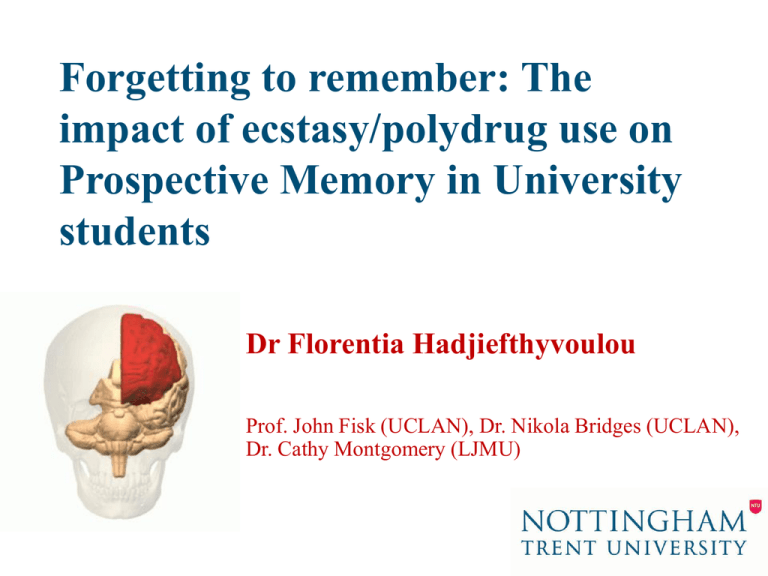
Forgetting to remember: The
impact of ecstasy/polydrug use on
Prospective Memory in University
students
Dr Florentia Hadjiefthyvoulou
Prof. John Fisk (UCLAN), Dr. Nikola Bridges (UCLAN),
Dr. Cathy Montgomery (LJMU)
Real World Memory
• Everyday memory
• Cognitive failures
• Prospective memory
2
What is Prospective Memory (PM)?
Prospective Memory
involves the remembering
to carry out a particular
behaviour some time in the
future (Ellis, 1996)
3
Classification of Prospective Memory
Prospective
Memory
Storage/retention
phase
Long term
Short term
Retrieval
phase
Time based
Event based
4
MDMA Neurotoxicity: Evidence from
neuroimaging studies
• Ecstasy increases serotonin levels in the
prefrontal cortices (Ricaurte et al., 1992)
• Serotonergic neural damage in the
hippocampus (Ricaurte et al., 1992; Fischer et al., 1995; Hatzidimitriou et al.,
1999)
• Serotonergic axonal loss in the frontal
cortex (McCann et al., 1998)
• Frontal lobe and hippocampus are
involved in memory functioning and play
an important role in PM processes
5
PM deficits in Ecstasy/polydrug users:
Neuropsychological evidence
• Heffernan et al.,(2001a;b)
• PM impairments in PMQ short-term, longterm and internally cued PM
• Effect not attributed to the use of other drugs
• Fisk & Montgomery (2008)
• Cannabis-related deficits on all aspects of real
world memory
• Rodgers et al., (2003)
• Long-term PM deficits associated with
ecstasy
• Short term PM deficits associated with
cannabis
6
PM deficits in Ecstasy/polydrug users:
Neuropsychological evidence
• Restricted to self-report measures
• Self-report measures limitations
-distinction of event and time based PM
-distorted self perception
• Some laboratory measures of PM
– Rendell et al. (2007)
7
Questions from previous literature
• Self-perceptions of PM lapses
–real or imagined?
• Ecstasy/polydrug-related deficits
–General PM deficits or task specific?
• Distinct drug effect?
8
Everyday and Prospective Memory deficits in
ecstasy/polydrug users
Rationale:
• To investigate the impact of EP use on
real world memory
• Simple laboratory measures of PM to
measure short/long term PM and
event/time based PM
Hadjiefthyvoulou et al. (2010)
9
Method
Participants:
• 42 EP users
• 31 non ecstasy users
• University students
Measures:
• A drug history questionnaire
• Measures of alcohol, smoking, health and IQ
Self-report measures
• EMQ, CFQ, PMQ and PRMQ
10
Method
Laboratory measures
- PM pattern recognition test (event based PM)
- PM fatigue test (time based PM/ short term PM)
- Long term recall PM (long-term PM)
- RBMT (2 event, 1 time based PM)
11
Effect of ecstasy/polydrug use on selfreport measures of real world memory
P<0.05
ecstasy/polydrug
non-ecstasy
Mean
values
ns
P<0.05
ns
P<0.05
ns
P<0.05
EMQ
PMQST
PMQLT
PMQIC
Techniques
CFQ
PM
Self-report measures
12
Effect of ecstasy/polydrug use on
laboratory measures of real world
memory
P<.01
Mean
values
ecstasy/polydrug
non-ecstasy
ns
RBMTAppt
P<.01
RBMTBel
ns
RBMTMes
P<.05
FatiguePM
P<.05
ProcessingSpeed Long Term PM
PM
Laboratory measures
13
Contributions of other drugs
• Cannabis
– Greater lifetime exposure and increased frequency of use
associated with poorer PM performance
• Cocaine
– Cocaine use was associated with most laboratory measures of
PM
– This study is the first one to link recreational use of
cocaine with PM deficits
• Ecstasy
– No aspect of ecstasy use was statistically significant as a
predictor of PM performance
14
Further evidence for PM deficits in
ecstasy/polydrug users
• Hadjiefthyvoulou et al. (2011)
– CAMPROMPT
– 3 groups
– EP related deficits in event and time based PM
– No significant differences in PM performance between
cannabis only users and drug naïve
– Cocaine use associated with poorer event based PM
– No aspect of ecstasy use was statistically significant as a
predictor of PM performance
15
General Conclusions
• Ecstasy/polydrug users are impaired in all aspects of
PM (not task specific)
• Cocaine is linked with PM lapses
• PM deficits are real rather than imagined
• Which drug is primarily responsible for PM deficits
• Ecstasy/polydrug use adversely effects students’
everyday functioning
16
Thank you for listening
florentia.hadjiefthyvoulou@ntu.ac.uk
17

